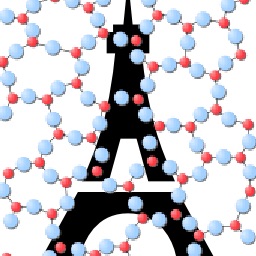Combinatorial molecular optimization of cement hydrates
Despite its ubiquitous presence in the built environment, concrete’s molecular-level properties are only recently being explored using experimental and simulation studies. Increasing societal concerns about concrete’s environmental footprint have provided strong motivation to develop new concrete with greater specific stiffness or strength (for structures with less material). Herein, a combinatorial approach is described to optimize properties of cement hydrates. The method entails screening a computationally generated database of atomic structures of calcium-silicate-hydrate, the binding phase of concrete, against a set of three defect attributes: calcium-to-silicon ratio as compositional index and two correlation distances describing medium-range silicon-oxygen and calcium-oxygen environments. Although structural and mechanical properties correlate well with calcium-to-silicon ratio, the cross-correlation between all three defect attributes reveals an indentation modulus-to-hardness ratio extremum, analogous to identifying optimum network connectivity in glass rheology. We also comment on implications of the present findings for a novel route to optimize the nanoscale mechanical properties of cement hydrate.
